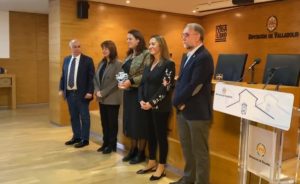Engaging with local government associations: a success story from Spain
21 November 2022
For much of the library field, the key target for advocacy efforts is local government. This is where essential decisions around funding and other resources are made.
While the main relationships here are directly between libraries and local authorities, a valuable complement to this can be work with local government associations that bring together mayors, chief executives and others.
To find out more about one successful example of engagement with such an association, we interviewed Francesc Xavier González Cuadra (President) and Alicia Sellés Carot (Past-President), FESABID, the Federation of Spanish Archive, Library, Documentation and Museum Asociations.

IFLA: What is the relationship between libraries and local governments in Spain?
Xavier and Alicia: Local governments are key for public library policies because 95% of the public libraries in Spain are their responsibility, and they work with autonomy and independence.
Most libraries are part of a regional library system/network, but this only means that regional or national governments subsidize part of the services (automatization, acquisitions or activities, for ex.).
How is local government structured in Spain – what organizations bring mayors and others together, and influence how they work?
Spain is organized in three different types of administration: the National, the regional (Autonomous communities) and the local. They have different competencies and there are mechanisms coordinating and enabling work between them.
Local governments themselves are associated in different regional associations (for example, the local governments from Valencia region) and then, those associations are members of the National Federation, the Spanish Federation of Municipalities and Provinces (FEMP).
The Spanish Federation of Municipalities and Provinces (FEMP) is the Association of Local Entities with the largest national scope, which brings together City Councils, Provincial Councils, Councils and Island Councils, a total of 7,410, representing more than 95% of Spanish Local Governments.
The FEMP is the Spanish Section of the Council of European Municipalities and Regions (CEMR) and the official headquarters of the Ibero-American Organisation for Intermunicipal Cooperation (OICI).
How long has FESABID worked with the Spanish Local Government Association (FEMP)?
FESABID has has a relationship with FEMP since 2008, as both are members of the CCB (Consejo de Bibliotecas de la Cooperación Española) but we have a strong commitment since 2018, the year in which FESABID initiated the study on the situation of libraries after the economic crisis (2010-2018).
This study was presented at the FEMP headquarters in January 2020 and led to a Declaration and an agreement to work together to promote and invest in libraries.
FESABID and FEMP also collaborate in a special group for libraries and rural areas in the framework of the CCB and that is why FEMP was a special guest at the presentation of the report “universalising library services in Spain” last year in the Senate.
You’ve recently been awarded a prize by the FEMP – what does this recognise?
This award recognises our “constant commitment to the local world”. More specifically, it highlights FESABID’s commitment to the right to access to reading and information in the rural world which focuses on the training and strengthening of library professionals, who carry out their work in an environment that is not always favourable to them..
The FEMP has recommended that every local authority should have a library – when did they start doing this, and how was FESABID involved in this?
In recent years, Spain has been working on depopulation issues. Basic services and fundamental rights must be reconsidered in the legal framework of local/regional competences and activities. The FEMP is working on potential changes in the minimum population for the provision of library services to become mandatory. Their proposal is to change this from 5,000 inhabitants to 1,500 inhabitants. FESABID, Of course, is supporting this in the CCB assembly and is advocating for the same in the Senate (Culture commission). In fact, this was a concrete petition in the public event at the Senate.
What impact do you think this recommendation has had on FEMP’s members?
The FEMP has made a study of the viability of this proposal in an economic way (which was presented in different organisms involved in potential changes to the legal framework) but, in our opinion, it has to be supported by regional or national public policies.
Furthermore, the FEMP organized a conference focused on reading services in rural areas in Urueña, last month, and we are working in the “Urueña Manifesto” to to gain more support and awareness for our asks here.
In what other areas do you work with the FEMP? Do you see any other areas where you could collaborate?
In addition to the Urueña Manifesto, we are collaborating in more ambitious projects in Spain. Both FESABID and FEMP are members of the group that is promoting the E-iris project, whose main objective is to fight the digital divide through municipal libraries. Libraries are outside the “digital skills” plans in Spain, and we are trying to get the funding to demonstrate the huge role that libraries can play in this.
What recommendations can you offer to libraries elsewhere?
FESABID is always working with to main “ideas”:
- Collaborate: No one ( associations, governments, institutions) can do it only by themselves
- Open: Libraries and professionals working in them are part of the cultural/ information system and environment, so they must be in connection with the other systems (economics, social, political, etc.